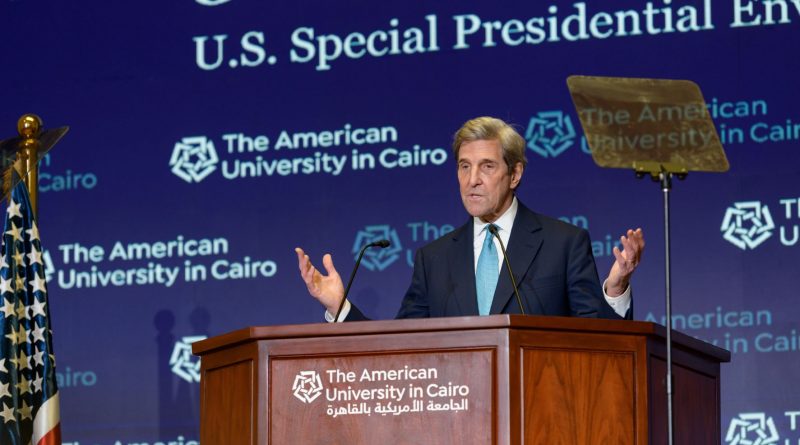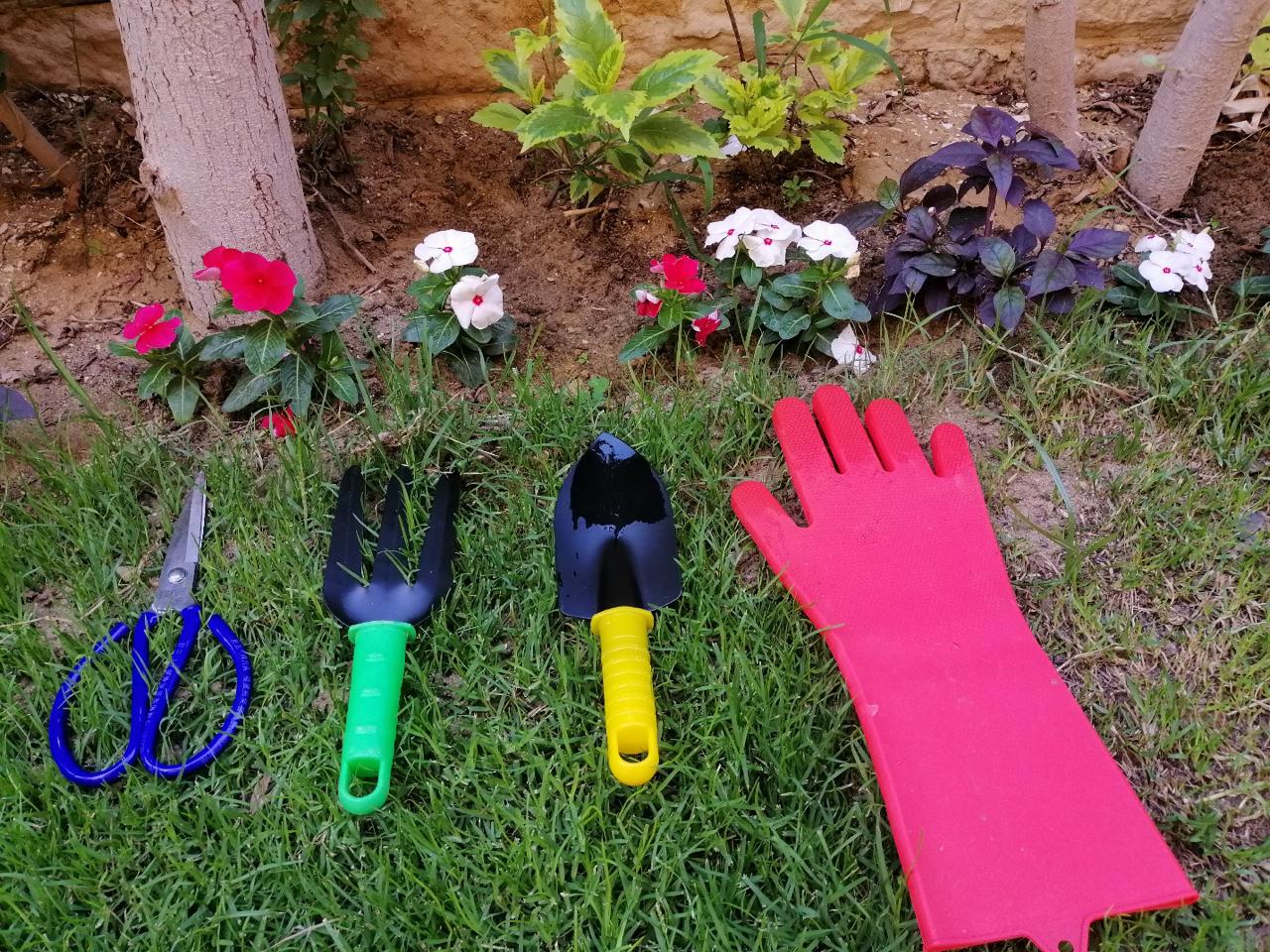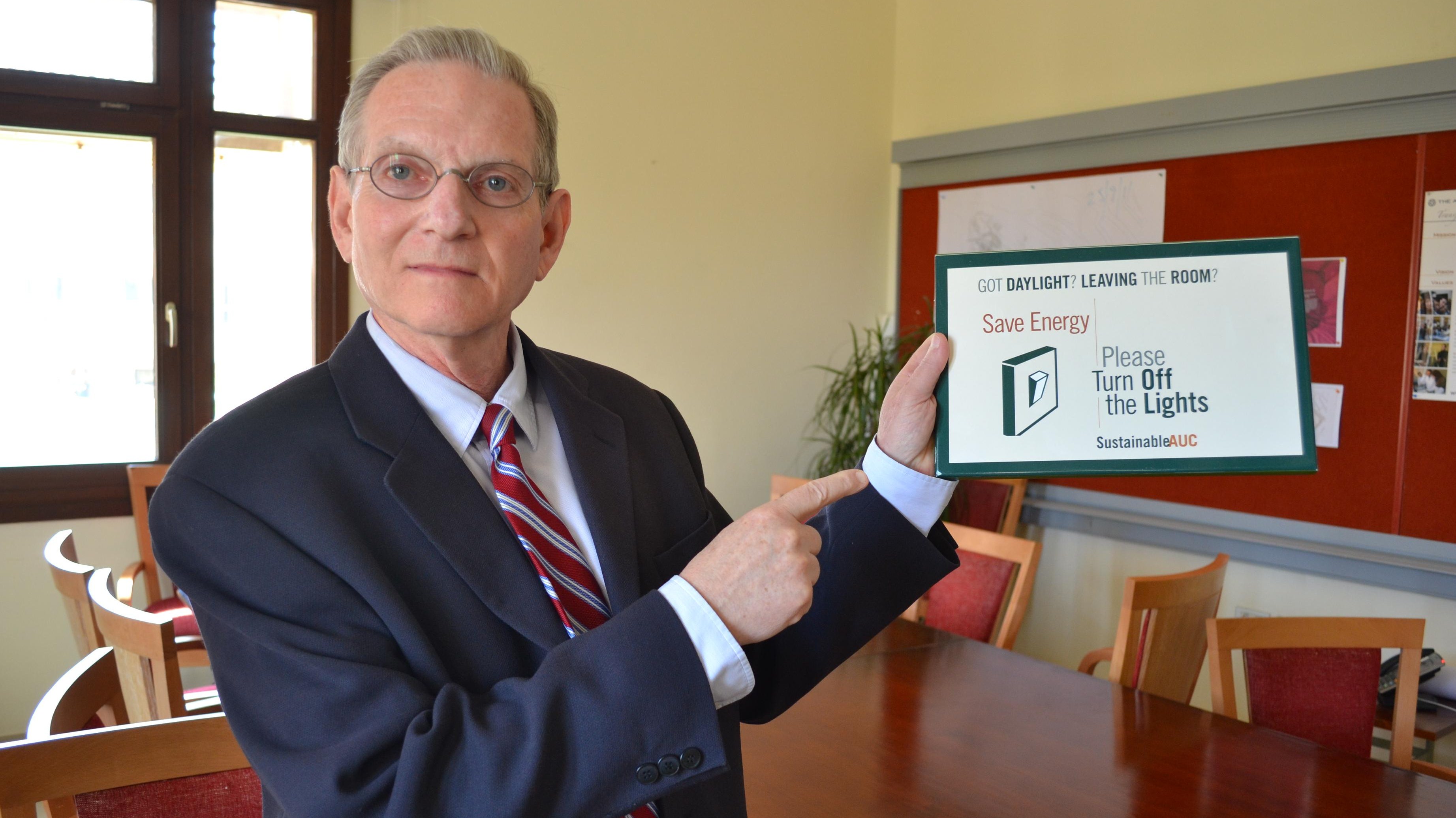World Must Honor Climate Change Pledges, Kerry Tells AUC Audience
By: Sawsan Ali
@SawsanHishamAli
Photo courtesy of Office of Marketing Communication and Public Affairs, AUC
In the buildup to Egypt hosting the critical COP27 United Nations Climate Change Conference, US senior diplomat warns the time to act is now.
US Special Presidential Envoy for Climate John Kerry has called on Egypt and the world to hold the “most important conversations in the history of human beings” on climate change.
During his special address on the future of climate change as Egypt prepares to host the COP27 United Nations Climate Change Conference this November, Kerry stood on the Ewart Hall stage in AUC Tahrir to discuss the magnitude of how we – the caretakers of the Earth – can drive action to address the issue before it’s too late.
“It is really good to be here, some eight months before Egypt will host COP27 in Sharm El-Sheikh, and I come here now, because these eight months are filled with promise and with challenge. And it is imperative we – all of us – do everything in our power to give life to the many commitments of [COP26 in] Glasgow. We must make these eight months count,” he said.
Kerry shed light on how we often hear about the cost implications of taking action to work towards solving the climate change crisis. Yet, we must remember to weigh these costs of action against the costs of our inaction, he warned.
On a global scale, the sea level rise that was anticipated within the coming century is now expected to occur within the next 30 years. Pollution is killing 10 million people yearly and extreme heat is taking the lives of another five million. The Thwaites Glacier, holding the West Antarctic ice shield in place, could fracture in five years.
“My friends, we know with certainty that it is human activity causing this, and only human activity can change course,” he said.
Kerry highlighted figures from a landmark report released by the Intergovernmental Panel on Climate Change (IPCC) 4 years ago. The report states that global temperature must be contained to 1.5 degrees celsius to avoid the worst consequences of the climate crisis.
At 1.5 degrees, staple crops, like corn, wheat and rice could be unpredictable and we could lose many of Earth’s coral reefs, small-scale fisheries and crustaceans. At two degrees celsius, we risk losing most of these staple land crops, along with the entire ocean ecosystem, dragging millions of people into starvation.
“The question at this point is not whether we can altogether avoid this crisis. It is whether we can just avoid the worst consequences. That is the grim choice that we have left ourselves, because of procrastination, disinformation, fear, distortion, even lies,” Kerry stated.
To put things into perspective, we are currently at a temperature increase of 1.2 degrees Celsius and heading toward 2.7 degrees.
“We were determined to leave Glasgow having kept alive the hope of limiting global temperature rise to 1.5 degrees. You know what? We made significant progress. In fact, the International Energy Agency has told us that, if all the commitments from COP26 are implemented, the rise in temperature of the planet would be limited to 1.8 degrees,” he said.
Although Kerry acknowledges that this is a reprieve, not a resolution, he is convinced that it is much closer to the 1.5 degree mark compared to where we were at the start of 2021.
“And what that tells me, at least, and I hope tells you is if we can bring other countries on board, we can win this battle,” Kerry stated.
In Glasgow last year, 65 percent of the world’s GDP pledged to pursue efforts to limit temperature rise to the 1.5 degree celsius mark through slashing greenhouse emissions by at least 45 percent by 2030 and targeting to achieve net zero emissions by 2050.
“That 65 percent represents the largest economies of the world and so, obviously, if you have 65 percent that are in the fight, you’ve got 35 percent that have yet to come to that fight,” he said.
The success of the momentum following Glasgow’s COP26 is conditional on many pillars. These include the almost 200 nations that came together to combat climate change turning their commitments into action, outlier countries strengthening commitments and the private sector following through.
“Momentum has never been a guarantee. It’s the gift of opportunity and it’s up to us to make the most of that opportunity. The job on the road to Sharm El Sheikh and beyond is to turn every one of those ifs into imperatives. It’s to turn pledges into proof of concept and it is to hold everyone accountable,” he said.
Kerry believes it is imperative to continue to build on efforts and commitments made in Glasgow to reach our target of holding global temperature at 1.5 degrees. He thinks this can be achieved by following a simple two word equation, which he calls: Implementation Plus.
“It means delivering on existing commitments that are not strong enough, raise the ones that are not strong enough, and create new commitments and efforts where none exist with respect to nationally determined contributions. That’s the lingo of the COPs. It’s the amount every country pledges to undertake here and that is a critical number which determines whether or not we are able to have a shot at holding on to the current capacity to be able to achieve our goals,” Kerry stated.
On the National level, the US and other countries like Chile and Canada, are taking steps to address the climate crisis. In Rwanda, Tunisia, Jamaica, Mexico and India, there are innovations taking place to address this challenge.
Even private companies, like Amazon, Volvo, Boeing, Apple, Maersk, Ford, General Motors, Airbnb – to name a few – and individuals, like Bill Gates are responding.
“The clean-tech revolution is where the money is – and every country on Earth stands to benefit. 2021 was a record-breaking year for climate-tech companies. More than $165 billion raised. And looking to the future, we are talking about trillions of dollars aimed at technologies ranging from green hydrogen to battery storage to electrolyzers,” Kerry said.
However, these efforts still need to be multiplied.
“Now, you are preparing to host delegates and stakeholders from around the world for what is, with no exaggeration, a continuation of one of the most important conversations in the history of human beings,” Kerry stated.
US ambassador to Egypt Jonathan R. Cohen also highlighted the launch of a bilateral climate working group as the most recent innovation in the US-Egypt relationship. This group was officially set in motion the same day as Kerry’s special address at the AUC Tahrir campus after the decision to launch it had been settled in the strategic dialogue last November.
Cohen added that the US lends its strong support to Egypt for the COP 27 and to all those who stand with climate action.
Additionally, AUC President Ahmed Dallal spoke of the role the university hopes to play in finding innovative solutions to this defining global challenge.
“Our scientists and other members of our community have formed the Climate Change Initiative and we intend to collaborate with sister universities in Egypt and from around the world. Universities have a special role to play in finding solutions and creating partnerships to see them realized,” Dallal said.




